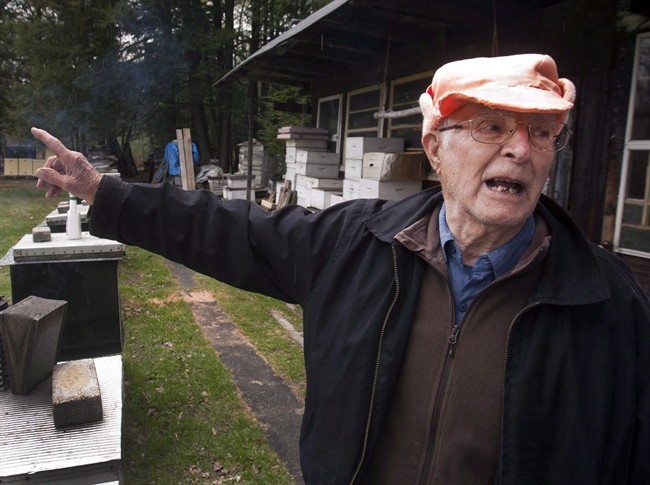MONTREAL – A Quebec man who was No. 2 on the Simon Wiesenthal Center’s list of most wanted Nazi war criminals has died, his lawyer said Thursday.

Vladimir Katriuk, 93, had been ill for a long time, Orest Rudzik said in an interview.
“He passed away, I think it was last Friday,” Rudzik said from Oakville, Ont. “It was a stroke or something do with a stroke.”
Katriuk, a native of Ukraine, lived in the Quebec town of Ormstown and had been an avid beekeeper for years.
A study three years ago alleged Katriuk was a key participant in a village massacre during the Second World War in what is now known as Belarus.
READ MORE: Russia seeks extradition of alleged Nazi collaborator in Quebec
The article said a man with Katriuk’s name lay in wait in March 1943 outside a barn that had been set ablaze, operating a machine gun and firing on civilians as they tried to flee the burning building.
The same document said the man took a watch, bracelet and gun from the body of a woman found nearby.
“One witness stated that Volodymyr Katriuk was a particularly active participant in the atrocity: he reportedly lay behind the stationary machine gun, firing rounds on anyone attempting to escape the flames,” said the article, authored by Lund University historian Per Anders Rudling.
Rudling, whose research was published in the spring 2012 issue of Holocaust Genocide Studies, attributed these details to KGB interrogations released for the first time in 2008.
- Wildfires are burning across western Canada. What to know
- Anger after Montreal cyclist hits child about to board school bus with lights flashing
- Tow truck driver after near-death experience on N.S. highway: ‘We fear for our lives’
- Vape liquids may release hundreds of toxic chemicals when inhaled, study finds
News of Katriuk’s death emerged just several hours after the Centre for Israel and Jewish Affairs said Ottawa should take the necessary steps to ensure he be held accountable if he were found guilty of war crimes committed in collaboration with the Nazis.
The Russian Embassy in Ottawa called on the Harper government a few weeks ago to support a criminal case against Katriuk, who moved to Canada in 1951.
In a 2012 interview with The Canadian Press, Katriuk repeatedly refused to discuss anything about himself – other than his passion for honey bees.
“I have nothing to say,” he said at the time of the accusations.
“When we talk about bees, that’s different. When we talk about my own affairs, that’s something else. I’m sorry.”
Asked how he felt about having his name on the list of worst surviving Nazis (he was No. 4 on the most-wanted list in 2012), Katriuk paused. He reached into a box and pulled out a piece of a beehive: “You see?” he said. “Here they have started to make the royal cell (for a queen bee).”
Pressed further about the allegations, he replied: “Let people talk.”
The Federal Court ruled in 1999 that Katriuk lied about his voluntary service for German authorities during the war in order to obtain Canadian citizenship.
The court concluded Katriuk had been a member of a Ukrainian battalion implicated in numerous atrocities in Ukraine – including the deaths of thousands of Jews in Byelorussia between 1941 and 1944.
But in 2007 the Canadian government overturned an earlier decision to revoke Katriuk’s citizenship, due to a lack of evidence.
Rudzik said he was informed of the death by a relative of Katriuk’s and that he last spoke to his client a few months ago.



Comments